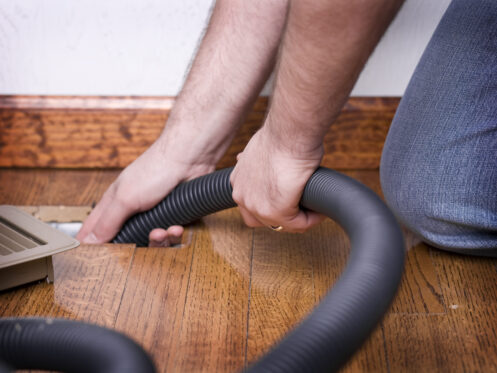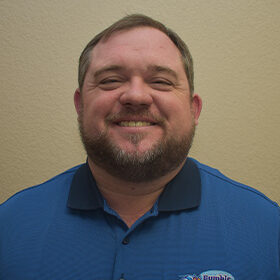Many internal and external factors can lead to a dusty and dirty HVAC system. Some examples of external sources include outdoor dust and debris, which are more prevalent in states that are comprised of arid regions like Nevada. Improperly sealed windows and doors also allow dust to enter a house. If you garden or have neighboring construction projects going on, the dust can become even worse.
On the inside, dust can build up because of irregular filter replacements and during restoration projects. Keeping an HVAC system clean of dust is vital to its overall performance.
Nevada’s Extremely Dry Air and Deserts
The desert climate of Las Vegas, NV is one reason why the city is so dusty. Because of the region’s average yearly rainfall of only 4 inches, lengthy dry spells are common. The dust also becomes much more of a problem in the desert because of the strong winds that blow there, carrying particles across long distances. And because of its position in the Mojave Desert, the city experiences far more dust than other cities.
Lower Efficiency
Air conditioning systems in Las Vegas are less effective because when dust settles on filters and other parts of an HVAC system airflow becomes constrained, making the system work harder to keep the temperature where it needs to be. The increased workload causes a rise in energy usage, which reduces the system’s efficiency. This results in higher energy bills.
Dirty Filters
Air filters in Las Vegas homes become dirty fast because of the fine dust that settles inside them. Dirty air filters reduce circulation, which forces the HVAC system to work harder to circulate air. This reduced airflow can lead to numerous HVAC problems, including frozen evaporator coils, overheating, and even system failure.
Poor Indoor Air Quality
Filters become less efficient at capturing airborne particles as they clog in dusty environments. This allows dust to travel more easily through the home and enter interior rooms. People living there may develop allergies and respiratory problems as a result of the air pollution.
Extreme Wear and Tear
HVAC systems have to work in overtime mode to compensate for the airflow restriction that dust causes. This puts extreme wear and tear on vital components, like the evaporator coils, compressor, condenser coils, heat exchanger, and blower motor. Replacing these parts can get fairly expensive.
Shorter Lifespan
The extreme wear and tear that dusty HVAC systems endure shortens their lifespan in several ways. Dust accumulation on coils traps moisture, leading to corrosion and reducing the lifespan of the coils. Dusty fan motors experience increased friction, causing the bearings to wear out quickly. Dusty heat exchangers fail to transfer heat efficiently, leading to system failures.
Ways to Keep the HVAC From Getting Dusty
Fortunately, there are many ways to protect the HVAC system in your Las Vegas home. Taking preventative steps will not only keep the system free of dust but also improve the overall interior comfort of your home.
Whole-home Sanitation
Whole-home sanitation services protect a home from dust in several ways. Service providers start by doing a thorough inspection of the home to pinpoint places that tend to accumulate a lot of dust. After that, they use high-tech cleaning equipment, including UV cleaners and air scrubbers.
UV lights effectively eliminate dust by disrupting the DNA of airborne particles. Air scrubbers efficiently remove dust particles from the air, capturing and trapping them in specialized filters. Both types of germicidal action not only reduce dust but also enhance indoor air quality, promoting a cleaner and healthier environment. To remove any lingering dust or allergies, service providers use sanitizing solutions to treat surfaces.
Use an Air Purifier System
For optimal results, use an air purifier in addition to a mechanical filter. A wide variety of air purifiers are available, with the majority of them relying on electrical charging to remove airborne particles. Their eventual disposal involves charging them to a plate or letting them fall to the ground, which requires extra vacuuming.
High-efficiency ultraviolet (UV) air purifiers eliminate dust, germs, and viruses by destroying them with light. Through the elimination of dangerous pollutants, this technology enhances indoor air quality, decreases allergies, and makes for a better living space.
Duct Cleaning
The dry atmosphere and constant dust make duct cleaning an absolute must for Las Vegas homeowners. When dust settles inside HVAC ducts, it lowers indoor air quality and reduces efficiency. By regularly cleaning the ducts, technicians can eliminate allergies, dust, and other impurities, leading to healthier air circulation. In addition to improving respiratory health, this also increases the longevity of HVAC systems. Furthermore, it makes Las Vegas a more pleasant and healthier place to live with our duct services.
Proper Humidity Control
Another way to reduce dust in HVAC systems in Las Vegas is to use a humidifier strategically. A humidifier keeps the air from being too dry by keeping the relative humidity in the air at an ideal range, usually between 30% and 50%. Proper humidity levels lower airborne dust particles, which in turn minimizes the likelihood of dust collecting on surfaces and HVAC components.
Enhance Ventilation
Improving a home’s ventilation is key to reducing dust because efficiently ventilated areas can disperse airborne particles, preventing dust from settling on surfaces. To ensure proper ventilation, seal all air leaks and consider using an advanced ventilation system.
You have two main options to choose from: heat recovery ventilators (HRVs) and whole-house ventilation systems. HRVs excel at exchanging indoor and outdoor air while retaining heat, preventing dust buildup. Whole-house ventilation systems provide a continuous flow of fresh, filtered air throughout the home, reducing the concentration of airborne particles.
Change the Air Filter
A high-efficiency particulate air (HEPA) filter is the most effective air filter for minimizing dust. This type of filter can catch particles as tiny as 0.3 microns in size. For the HEPA filter to work at its best and keep dust from building up in the house, you must clean or replace it regularly. In Las Vegas, this usually means replacing the filter once every four to eight weeks.
Use Vent Covers
To reduce dust, use vent covers made of fine mesh or with filters. These coverings impede the passage of airborne particles into the HVAC system therefore decreasing the circulation of dust. Just like air filters, you must clean or replace vent coverings regularly.
Schedule Regular HVAC Maintenance
To keep the HVAC system from getting dusty, HVAC maintenance must be a priority. Technicians can help with filter changes while also inspecting the system for dust accumulation. Experts have the skills and tools that it takes to effectively identify and fix dust problems quickly.
Bumble Breeze offers lots of services to keep your home free of dust. We specialize in duct cleaning, air purifiers, UV lights, humidifiers, HVAC maintenance, and more. Many Las Vegas homeowners come to us for all of their HVAC and plumbing needs. Give us a call now to learn more about the ways Nevada’s dust can affect your HVAC system.


